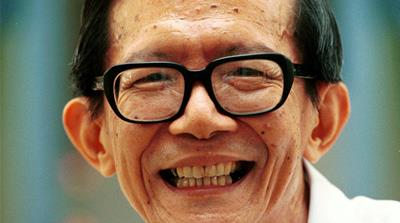Singaporean artist jailed after peaceful protest
Singapore – A 34-year-old performance artist is serving a two-week jail sentence for what he and his supporters consider a peaceful one-man protest.
Human rights groups and arts supporters are calling for the release of Seelan Palay, who was sentenced under Singapore’s tough public order law. Defenders see the law as a necessary deterrent to public disorder in the strict city-state.
Palay was sentenced by a Singapore court on October 3 following a performance titled “32 Years: The Interrogation of A Mirror,” commemorating Singapore’s longest held political prisoner, Chia Thye Poh, who spent 32 years in detention until his release in 1998.
A district court ruled Palay staged a demonstration without a permit in violation of the Public Order Act, designed to protect national security.
Human rights groups denounced the sentencing as an affront to free speech and called for Palay’s immediate release.
“The conviction of artist and activist Seelan Palay for being ‘a threat to public order’ is absurd and highlights the lengths the Singaporean authorities are willing to go to silence dissent,” Josef Benedict, a researcher with the NGO Civicus, told Al Jazeera.
“The right to peaceful protest is an essential part of a democracy, which Singapore claims it is, and should be respected instead of criminalised”.
|
Singapore summit: Discussing human rights |
Amnesty International said in a statement, “The organisation considers the conviction a violation of the right to freedom of expression and calls for the quashing of the conviction and sentence.”
The Observatory for the Protection of Human Rights Defenders “calls on the authorities of Singapore to immediately and unconditionally release Mr Seelan Palay and end all acts of judicial harassment against him and all human rights defenders in the country”.
Human rights watchers earlier accused Singapore of using its Public Order Act to restrict freedom of expression.
‘Art without fear’
The arts groups Freemuse and Artists at Risk Connection said in a joint statement: “We … ask that the authorities work to uphold the human right to freedom of expression to enable artists like Mr Palay to create art without fear, as freedom of expression and peaceful protest are essential components in the creation of a functioning and vibrant society.”
But others defend Singapore’s stress on public order, saying it goes back to its political fragility as a new nation in 1965. Freedom of speech and assembly are included in Singapore’s constitution, but the Public Order Act allows authorities to regulate assemblies and processions in public places when they deem necessary, legal experts say.
“In Singapore, there is little tolerance for disorder, and the racial riots in 1950s and 1960s have been attributed to assemblies and processions becoming unruly and prone to disturbance,” Eugene Tan, an associate professor of law at Singapore Management University, told Al Jazeera.
“As such, Singapore authorities make no apology for the uncompromising approach, and the public has accorded legitimacy to such restrictions.”
Palay’s sentencing came one year after his performance on Oct 1, 2017. He had applied for and received a license to hold an event at Hong Lim Park, the location of Speakers’ Corner, the former British colony’s version of London’s Hyde Park Corner.
At the event, Palay spoke to some 20 to 30 attendees, and quoted Chia on his 32-year detention.
“My ideal has not been dampened after more than 30 years under detention. In fact, prison life can only make a person more determined to fight against oppression and for a just, fair and democratic society.”
While the permit for his performance was restricted to Speakers’ Corner, Palay left for a solo procession to the nearby National Gallery and then Parliament House, where he stood at an entrance holding up a mirror as a prop.
|
Singapore: Asia’s greenest city |
Police told Palay he was committing an offence under the Public Order Act and asked him to leave. He was arrested after he refused.
Immoral act?
A district court found him guilty of conducting a procession without a permit under Section 7 of the Public Order Act. Palay was fined SGD$2,500 ($1,800) but because he refused to pay, he must serve two weeks in jail instead.
“The accused had set out to deliberately break the law that day,” Deputy Public Prosecutor Dwayne Lum told the court.
Lum unsuccessfully sought the maximum sentence of a $3,000 fine, sayingPalay had been charged three times in 2010 on similar charges, and each time served jail terms in lieu of paying fines imposed by courts.
 |
| Chia Thye Poh seen here in 1998 after his release [File: Ng Han Guan/AP] |
Representing himself, Palay told the court: “I would like to reiterate that I did not threaten Singapore’s public order, national security, relations with other countries, or commit an immoral act.”
Palay has sought to bring attention to the plight of Chia Thye Poh, who in October 1966 was arrested for anti-government activities and imprisoned under Singapore’s Internal Security Act, which allows for detention without trial.
He was imprisoned for a total of 32 years – 23 years in detention without trial followed by another nine years of house arrest – becoming the city-state’s longest held political prisoner.
Chia was nominated by supporters in 2015 for the Nobel Peace Prize to highlight his efforts to champion political freedom. Supporters noted his 32 years in detention was longer than South Africa’s 27-year imprisonment of Nelson Mandela, who won the Nobel Peace Prize in 1993.
Follow Tom Benner on Twitter: @tgbenner




